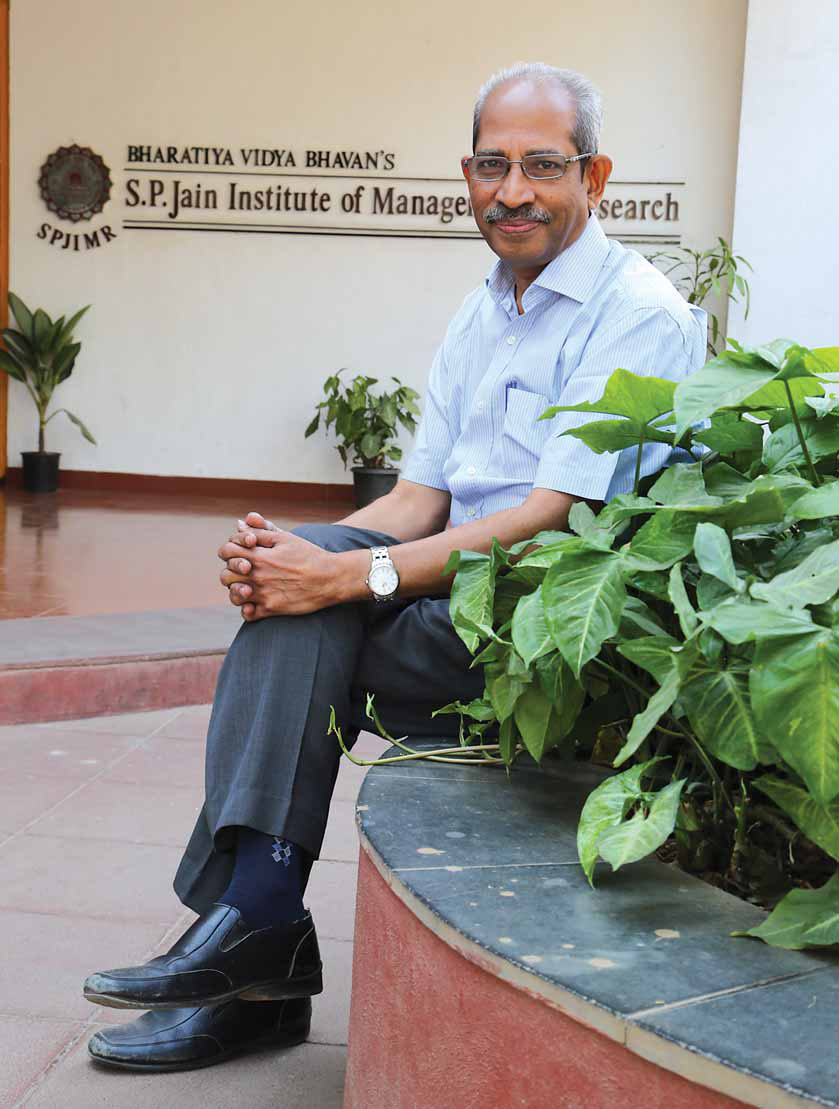
Bharatiya Vidya Bhavan’s S.P. Jain Institute of Management & Research (SPJIMR) is one of the premier business schools in the country, and is consistently recognised as one of the top 10 business schools in India. The Institute has been ranked fourth in the latest B-school rankings released by the Business Today magazine. SPJIMR disaffiliated from the then Bombay University in 1991 to have freedom in course curriculum, pedagogic innovations and building pioneering programmes in socially undermanaged sectors, marking the beginning of a journey to achieve its mandate of offering a unique innovative and distinct path in management education. The Institute has an enviable track record of recognising the needs of society, especially the undermanaged sectors. Corporate Citizen met up with Dr R Sesha Iyer, former Director, Professor and Advisor to the Dean, SPJIMR; an intellectual, down-to-earth, and affable gentleman, who took us in and out of SPJIMR, throwing light on its different courses, curriculum, students, and also the history of this prestigious institution. Read on…
S.P. Jain Institute of Management & Research (SPJIMR) is a unit of the Bharatiya Vidya Bhavan, our parent society which is a public trust founded in 1938 by the late Kulapati Munshi with the blessings of Mahatma Gandhi and the active support of several eminent leaders like Sardar Patel, Dr Rajendra Prasad, Pt Jawaharlal Nehru, Shri C Rajagopalachari, Dr S Radhakrishnan, among others.
The objective was to take the Indian culture and Eastern ethos to the world. They started cultural centres and education for Sanskrit in schools and colleges. At present, the Bhavan has more than 300 institutions in India and abroad. SPJIMR is on the Bhavan’s campus (Andheri), Mumbai, which is one of the many centres, with a school, two engineering colleges, a college for streams such as Arts, Science and Commerce, a Shiva temple, our management Institute (SPJIMR), a yoga centre and a nursery. All of these are spread across 45 acres of our campus.
Initially, SPJIMR was one among the three management institutes in Mumbai, all affiliated to the University of Mumbai. In 1985, Dr M L Shrikant, former Hon. Dean, SPJIMR, who held senior positions in various organisations was approached by the Bhavan to take up the management of SPJIMR. Dr Shrikant, a DBA from the Harvard Business School, among many other qualifications, accepted the position and served as Honorary Dean of SPJIMR.
He believed that the university system was a hindrance to rapid change, and took the decision of disaffiliating SPJIMR from University of Mumbai. At that time, it was a bold step because your own independent entity could survive only if you had your own brand name. You could take this step only if you had the conviction and the confidence that you could make a change and build a brand of your own. This was when C.Subramaniam was the President of the Bharatiya Vidya Bhavan and S. Ramakrishnan was Secretary, Director General. Subsequently, the PGDM autonomous programme was approved by AICTE, under the HRD ministry. Since 1991, the initiatives taken by Dr Shrikant placed SPJIMR on a trajectory of growth and made it what it is today.
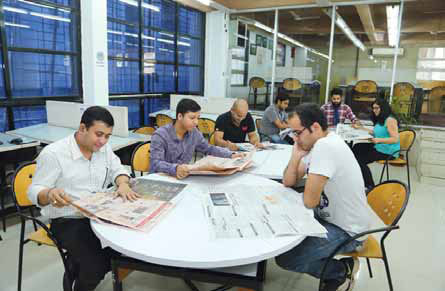
It is amazing to see the way Dr Shrikant has built this institution. In the beginning, he brought in a lot of material from professors of leading institutions like Harvard, Wharton and Stanford, who had taught him. The method of simulation teaching, case study, were similar to those taught at globally renowned schools. But for developing socially sensitive, socially responsible, ethical leadership, he started a number of initiatives rooted in the Indian value system.
There was a judicious synthesis of Western efficiency and Eastern ethos. Simultaneously, he understood the value of recruiting highly experienced corporate professionals, along with a qualified, research-oriented PhDs. He would train the corporate leaders to become great professors as well. When I joined here, I remember, 50 percent of the faculty here were from various industry houses and they were good teachers as well.
In any management education, one part is knowledge, the other is skill and third is attitude. The management in the West contributed a lot in knowledge and skill, theories and frameworks and so on. Most of the management books are from authors from the US, so different skills such as negotiation, analytical, mathematical modelling and pedagogical methods like case studies were brought in. But, as Harvard Professor Dr Srikant Datar has pointed out, much more needs to be done in the attitude aspect of education. During the economic crises, it was proved that something was lacking in the attitude development in the business education. Post the economic crises, Dr Datar who conducted seminars at IIMs and other leading management institutions in India, explaining what management institutions should do, found that our then Hon. Dean Dr M L Shrikant had already initiated similar practices at SPJIMR, like our focus towards attitude building. Management education has a role to play in nurturing future leaders who will have an impact on society. At SPJIMR, the leadership development is based on self-development and core values.
Our flagship programme, PGDM is the regular two-year, full-time residential post-graduate diploma in management programme for students with an experience of zero to four years and with core values and an attitude to serve. We also have the PGPM programme for managers with five years of work experience
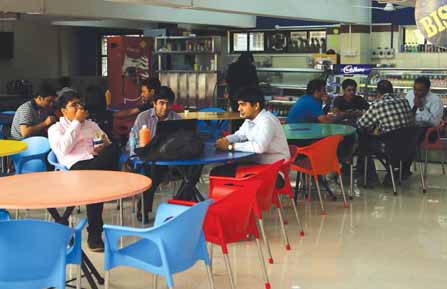
We have different programmes, each targeted in influencing practice in sectors which have significant role to play in the Indian economy and the society.
Our flagship programme, PGDM is the regular two-year, full-time residential postgraduate diploma in management programme for students with an experience of zero to four years and with core values and an attitude to serve. We also have the PGPM programme for managers with five years of work experience. It’s a 15-month residential programme, from where they move on to take up positions with greater responsibilities. It helps them accelerate career growth; it also helps the organisation as they get a lateral entry of experienced people, leveraging their previous experience.
The third programme is the Family Managed Business Programme (FMB). SPJIMR is a pioneer in the field of family-managed business. The programme is meant for children of owners of businesses which have been around for long and are ready to notch up their operations to the next orbit. They are from diverse businesses from across India.
The course is designed such that the participants can continue to work with their parents/owners/mentors. They attend class for a week each month, where managerial inputs are given and the remaining three weeks they put this learning to application in their businesses. They also go through a lot of practical projects. This innovative pedagogy has made SPJIMR one of the leading institutions in the niche of family-managed businesses.
Another pioneering programme is the Post Graduate Executive Management Programme (PGEMP), a collaborative executive management programme. We have collaborated with about 30-35 companies. The companies select potential leaders who have/are working in the company for three or five years or even more and send them to us. We interview the candidates sent to us and choose the best. In a group of 50 people, there may be students from five to six companies. Here we carry out case studies and a lot of theories along with a lot of peer learning, which is very effective. There could be candidates from companies like L&T, BPCL or SBI who come together, thereby making the case studies even more effective. Here we admit 50 students who come to the college for nine days, every three months.
Our PGDM and PGPM programmes are approved by AICTE. Rest of the courses are our own programmes but they have got international accreditation like from the Association of MBAs (AMBA), UK.
Another programme that we have is the Post Graduate Programme in Development Management (PGP-DM), exclusively for the development sector. In a country like India, NGOs play an important role and the CSR activity to help NGOs is growing. Their relevance and importance is very high. If you want to reach every corner of India, it is important to spread out through NGOs; one cannot do it from a central agency. Therefore, we thought that we should give managerial inputs, and yes there is high potential for this development sector to scale up and improve efficiency.
We have a Global Management Programme to enhance global connectivity and also carry out short-term programmes like Grow Your Business (GYB) and Start Your Business (SYB) to promote entrepreneurship. Today, the opportunities for entrepreneurship, especially social entrepreneurship is very high. There is another programme in Project Management which is applicable to projects as well as organisations.
"We receive about 17,000 applications every year for the 240 seats for Indian nationals and are permitted to take 15 percent above this as foreign nationals, which includes Persons of Indian Origin (PIOs). We get to know about the candidate by looking at the personal details they send in and through the interviews we conduct, ensuring the finest get through"
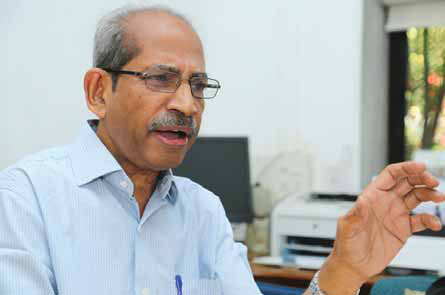
Our faculty enjoy freedom at work. Apart from teaching, undertaking research work and conducting management development programmes, a majority of the faculty have a role in administration and institution building. So, if Dr Shrikant, with his vision, was able to take SPJIMR to new heights, it was because of his ability to delegate, creating a sense of ownership and inspiring them to contribute. This way we all contributed in building this institution. Creating a culture of collaboration, self-accountability, freedom has always been the norm here. Today, we have about 45 core faculty members, 12 adjunct faculty members and a good number of visiting faculty. About 10 percent of the core faculty are taken from reputed institutions from abroad.
Our PGDM programme is at par with some of the best in the country. Under the AICTE approval, our framework and eligibility criteria are in line with the framework of the regulatory body.
We receive about 17,000 applications every year for the 240 seats for Indian nationals and are permitted to take 15 percent above this as foreign nationals, which includes Persons of Indian Origin (PIOs). Along with their academic performance, relevant work experience, students’ versatility we look at their attitude, mindset, humility, communication, accommodativeness, flexibility and so on. We get to know about the candidate by looking at the personal details they send in and through the interviews we conduct, ensuring that the finest get through.
In many national and global competitions, our students win, competing with students from leading management institutes. Recruiting companies too have positive feedback for our students, their excellence and service-oriented attitude.
In terms of eligibility, every student should have scored a minimum of 85 percentile in CAT/XAT and 650 in GMAT. There’s an experience criteria too: like for PGPM, a minimum of five years of work experience is needed. Admission is completely on merit and there’s no quota system for anybody. The gender diversity at SPJIMR, is good with around 40 percent of the participants being girls.
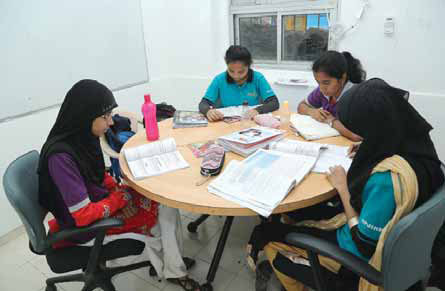
We are not competing with anyone as such. We believe that we should continue to strive towards excellence and contribute where we can. Competition is only in terms of whether we can be better. We feel a sense of satisfaction when someone tells us that our ranking has improved. When companies tell us that our students are good, we are happy. If our students are getting the same package as those from leading IIMs and others, we are happy. Even in terms of teaching, someone speaks well about our teaching style, we are happy. There is no competition as a threat to our survival. We do compete to excel in our areas of work.
We’ve been a self-financed institution and generate adequate funds. We get reasonable fees from PGDM and PGPM courses to meet all kinds of expenditure, so there’s no deficit. Also, with our other programme like Executive Management Programme, Family Managed Business Programme and Management Development Programmes, we have generated a surplus and have generated a corpus as well.
GMAC wanted to fund our programme called ‘Abhyudaya’ where our PGDM students mentor underprivileged schoolchildren and help them out. So, there we received funding from GMAC. In some of the research that we are undertaking in corporate social responsibility, we received funding from the foundation of CSR. However, these kinds of funding are in the form of awards of recognition, otherwise SPJIMR doesn’t need financial funding from any outside agency. We are a non-profit institution, part of the Bharatiya Vidya Bhavan.
There are two kinds of international exchange programmes—one is the ‘Exchange’ programme and other is Global Fast Track (GFT).
We have a tie-up or an MOU with about 30 global institutions, mostly in Europe and the USA, and 35-40 students go every year as part of the Exchange programme. We also run a Global Fast Track (GFT) for students of PGDM (and a similar one for PGPM) for all participants. Under this, we sign agreements with leading international B-schools like Purdue University (Krannert School of Management), Cornell University (Johnson School of Management), Carnegie Mellon University (Tepper School of Business) and Darden School of Business (University of Virginia). In this programme, the participants learn advanced courses, carry out industry visits and work on projects for three weeks, in the area of specialisation, in these schools.
All management students generally do an internship (corporate training) on completion of the first year. But our students in PGDM, after the first year, go to work for six weeks with an NGO. The benefit here is that we can give some managerial inputs to the NGO; many a time some NGOs are so creative that our students learn a lot from them. Students learn decision making in unstructured environments. They are also sensitised to how the people live in different parts of India.
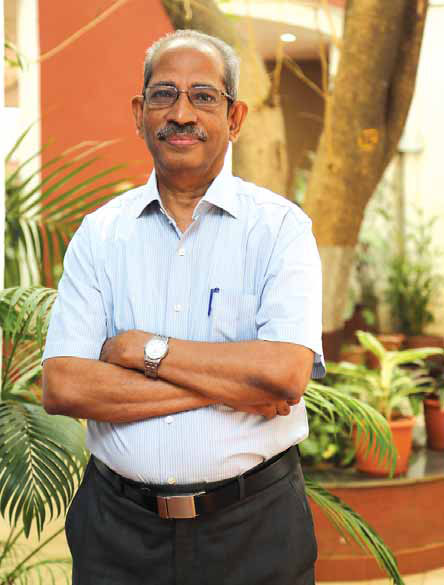
Leadership Development at SPJIMR is based on self-development and includes some distinctive initiatives.
The first is the Development of Corporate Citizenship (DOCC), under which the participants undertake their rural internship after the first year.
Then there is the ‘Science of Spirituality,’ which was earlier delivered by Sri Swami Viditatmananda, a disciple of Sri Swami Dayananda Saraswati, but later on Dr Shrikant, himself took up the course and developed it. This course has been designed to provide students an opportunity to reflect deeply on the way they look at their life, the world and their role in society to be a net contributor.
The third programme is called the PG Lab—Personal Growth Laboratory. The participants, within the first two months of college travel to Lonavala for four days, and undertake exercises to help them know themselves better and know their teams better. They move from “me” to “we”.
Another important programme is the Assessment & Development of Managerial & Administrative Potential or ADMAP, where the students learn administration through active participation.
‘Abhyudaya’ is a project where we mentor underprivileged children from schools. It is a unique pedagogic innovation which aims to address issues of urban poverty and foster social responsibility and character building among B-school students through ‘experiential learning’. Started in 2008, this project was conceptualised and guided by the Dr M L Shrikant.
These Leadership Development programmes are our jewels and help us build and shape attitudes, or the ‘being’ aspect of management education. These non-classroom programmes enable our students to stand out and serve while delivering superior business performance at the same time.
"Our average packages are in the range of Rs.17-18 lakh per annum. We’ve always had 100 percent placements as participants usually get more than one offer each. But we are more interested in the profiles our students are offered. Our students are very selective on the profile. Placements are offered only for the PGDM and PGPM programmes"
Our average packages are in the range of Rs.17-18 lakh per annum. We’ve always had 100 percent placements as participants usually get more than one offer each. But we are more interested in the profiles our students are offered. Our students are very selective on the profile. Placements are offered only for the PGDM and PGPM programmes. We have found, for PGPM that on an average, there is a 60 percent increase on their earlier salary in the placement package. In the case of PGDM, the average packages have been consistently rising. When I joined in 2006, the average package was about Rs.6-7 lakh, but this year, it was Rs.17-18 lakh. We are one of the few institutes that submit the placement report for auditing to CRISIL.
Only recently, we announced another outstanding season of placements for the PGDM class of 2016. This year witnessed 89 companies hiring 226 management graduates from the PGDM class of 2016. The average salary increased to Rs.19.3 lakh, from Rs.18.2 lakh last year. The highest salary offered on campus also spiked by 25 percent to Rs.37 lakh per annum. 82 percent of the students received offers of Rs.15 lakh or more, with a median salary of Rs.17.38 lakh.
I feel we learn many things from the youngsters of today. They are well informed and have their own views on a lot of things. There are many youngsters who are genuine, good natured and humble. Today, youngsters want more freedom. They want to explore, learn themselves, rather than sitting in the class. That way, we should adjust and talk in their language. Elders do learn from youngsters these days.
I joined SPJIMR as a professor in 2006 and became the Director in 2007. Dr Shrikant was the Dean, and Chairman of the Andheri campus. I was actively involved with him in contributing to the Institute, right from getting the programmes implemented, getting people on board, and students along with getting AICTE approvals. In 2015, after I retired, we were fortunate to have a new Dean, Dr Ranjan Banerjee, and he has conducted a series of meetings with all stakeholders—faculty, governing body, alumni— and a shared vision has been evolved. Many new initiatives like research seminars to faculty by professors from London School of Business and reputed US schools, new course on Design thinking, enhancing corporate connect are on the way.
The vision is being socialised by the Dean to various stakeholders, including in alumni meetings across the globe.
Our vision is to be India’s most innovative and socially responsive school of management. We offer a unique blend of classroom and non-classroom methods of education. We are world leaders in non-classroom education.
Our mission is to Influence Practice and promote Value-based Growth. Our students will recognise, understand, and uphold the social relevance of business decisions, including within the underserved sections of society.
We uphold this mission because we recognise our twin roles—as a responsible member of Bharatiya Vidya Bhavan and as a responsive member of Indian society at large—and look at ourselves in a wider context as a ‘Beyond MBA’ institution.
Business organisations have a very large role and impact on the society. They not only offer goods and services but also influence your lifestyle. If corporates are to contribute to society at large, we should touch those future leaders who are soon going to occupy senior positions in industry. We at SPJIMR put the participants on a path of self-development and core value building.
I did my B.E. Mechanical from Kerala in 1969 and topped the University. I could have got an opportunity to go abroad, but I took up a job close by. I worked in HMT for 12 years and two years in Cochin refinery. I completed my PhD in Operations Management and my M.Tech in Production Engineering, ICWA. In 1985. I came to Mumbai where I met the Father Agnel leadership at Bandra and helped them start an engineering college. I worked with them for 22 years, simultaneously holding many positions in the University of Mumbai and then joined SPJIMR in 2006. Today I am 69. My wife recently retired from the AG’s office. I have two children. My son works in the US, at Phoenix, Arizona, and my daughter works in the UAE.
BY MAHALAKSHMI HARIHARAN